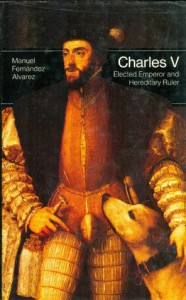A useful introduction to an important monarch

Charles V stands as one of the greatest monarchs in history. As king of Spain and Holy Roman Emperor, he ruled over an empire that stretched over four continents to total over 1.5 million square miles. His reign included innumerable wars, dynastic struggles, and the growing challenges posted by the Protestant Reformation to the religious stability of Europe. Yet for all of Charles's prominence there are few biographies available in English about him, leaving readers with few options when it comes to studying the life of this fascinating figure.
This problem only enhances the value of Manuel Fernández Álvarez’s short study, which provides a concise description of Charles’s life and reign for interested readers. Álvarez presents Charles as a devout ruler who struggled to manage such a diverse and far-flung empire. Much of his reign was spent in transit, having to deal with various expensive crises at one end of his European realm or another. Succeeding to the Spanish throne after the death of his grandfather, Ferdinand, he had to address the discontent of many Castilians, which broke out into open rebellion. Winning election to the Holy Roman Emperorship in 1519 only added to his burdens, particularly with the challenge posed by the French king Francis I. Francis emerges in Álvarez’s narrative as Charles’ bete noire, particularly after Francis broke his oath to the Holy Roman Emperor after his release from Charles’s custody in 1526, and the two often struggled for dominance in Europe. Though Charles enjoyed further successes, final victory was perhaps unattainable, and a series of setbacks led Charles to retire from the throne three years before his early death in 1558.
To summarize such a reign is no easy feat, and it is a measure of Álvarez’s ability that he does so as efficiently as he does. Yet the author’s narrative suffers from a lack of analysis. There is little sense of his subject’s inner life, and his explanation of Charles’s motivations, strategies, or broader goals is similarly deficient. Though such an absence is somewhat understandable in a book as short as this one, it is lamentable given Álvarez’s expertise on his subject and the dearth of English-language biographies of this fascinating figure. As a result, English-language readers desiring to learn about the emperor might find themselves having to settle for this informative yet ultimately limited study, which serves as a good introduction but for now has to fill a larger gap than it should.
 3
3






